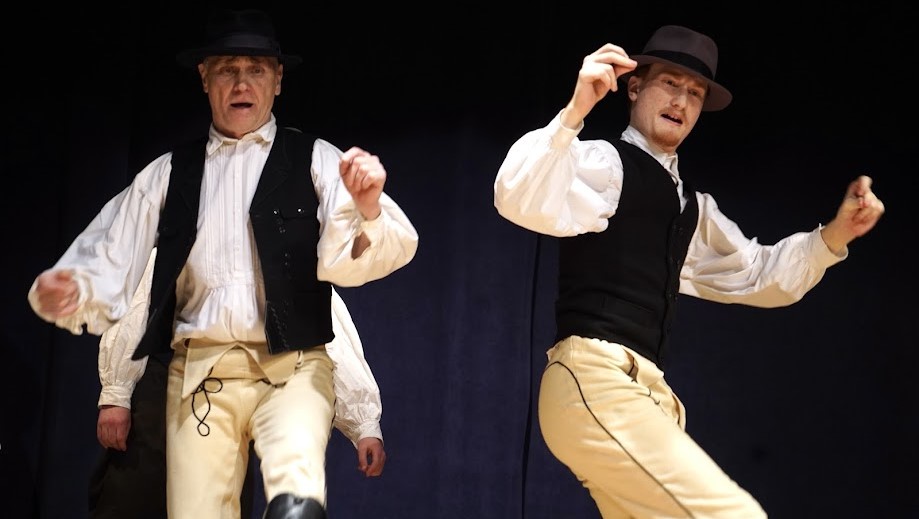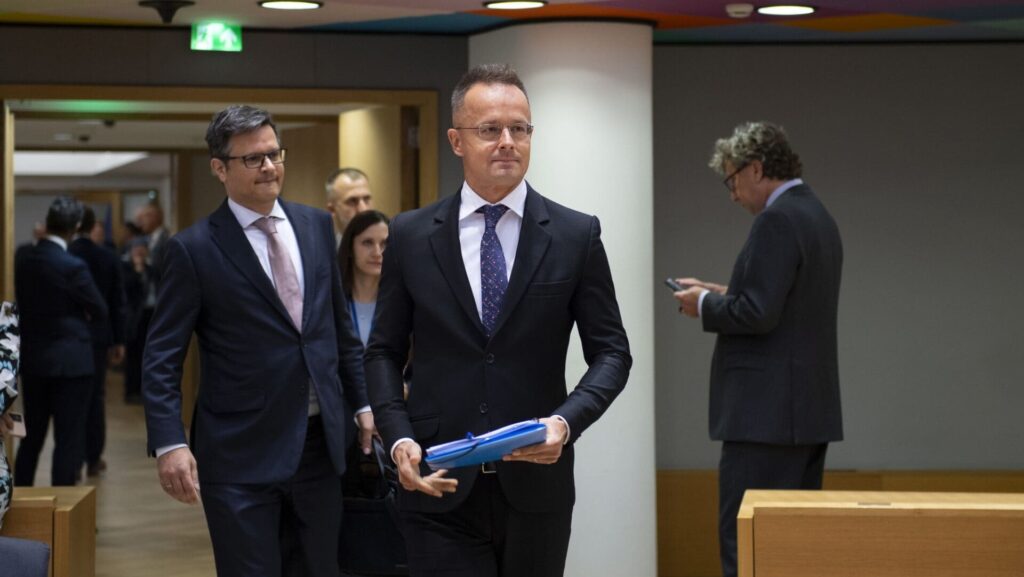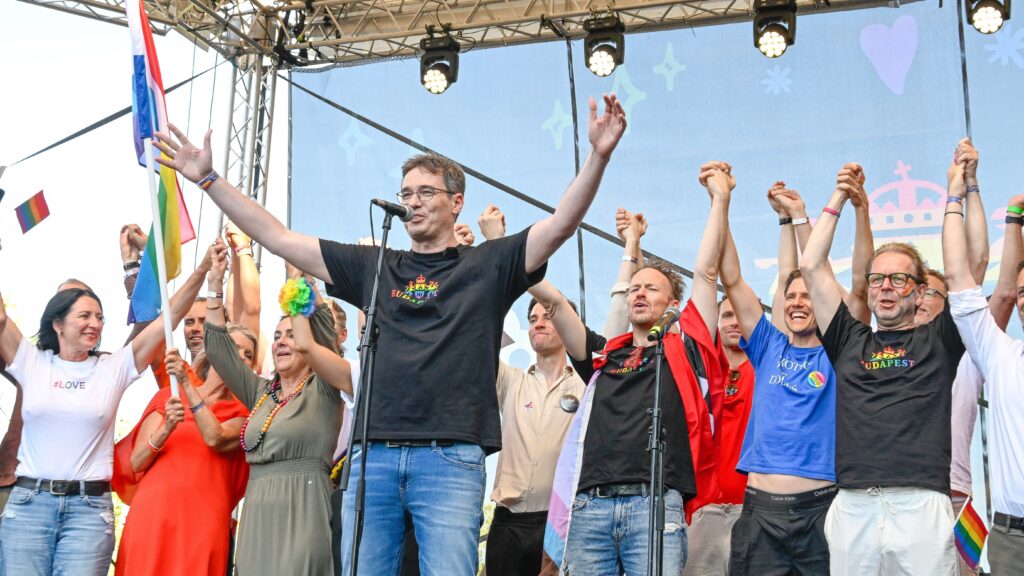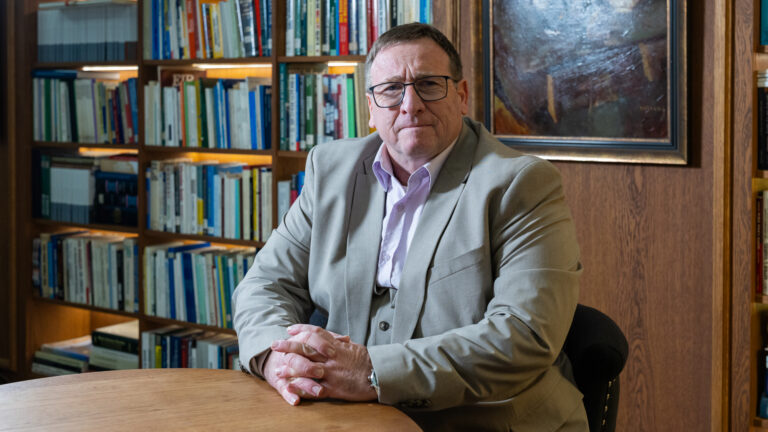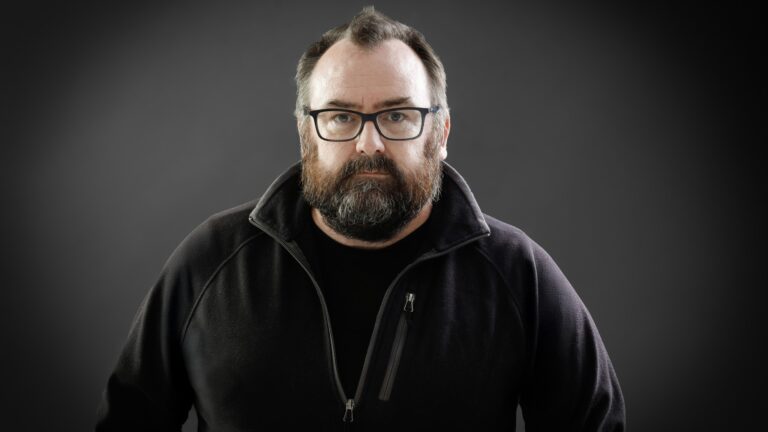This is an abridged version of the original interview, published online on 777blog on 9 June 2023.
After interviewing mostly elderly or middle-aged individuals active in Hungarian American communities, I’m now introducing a promising 17-year-old from New Brunswick, New Jersey. Hunor’s mother leads the local Csűrdöngölő adult folk dance ensemble, organized the 2023 Pontozó, North America’s largest Hungarian folk dance festival, and was also responsible for the program of the Hungarian Festival, the most well-known Hungarian event in the region. At Pontozó, Hunor performed in at least five numbers, winning a top gold certificate in solo and duo categories, and receiving recognition for all his group performances.
***
While your mother became a folk dancer only as an adult through your father, you were born into it. You’ve been traveling to Hungary and Transylvania alone every summer since you were a child. Where does your commitment come from?
I was indeed immersed in the world of Hungarian folk culture from the very beginning. Every Friday, during the Csűrdöngölő adult dance rehearsals in New Brunswick, New Jersey, I’d sleep in my stroller in the hallway while my parents danced. I don’t remember who first initiated the overseas trips and camps, but I definitely agreed to and enjoyed them. Initially, we traveled together to visit relatives, or later, my parents sent me to stay with them. Then, my parents took me to folk dance camps, but only for a day or two at a time since they didn’t have more vacation days. However, I liked it so much that I wanted to stay longer. So at first, I attended one or two week-long camps, then gradually increased to six or seven week-long summer camps. I’ve been all over Transylvania (Romania)—from Kalotaszentkirály (Sâncraiu) to Válaszút (Răscruci)—and later, in Hungary as well.
Who did you meet there? Who were your teachers?
At first, I only knew a couple of people, but over time, I met more and more. For example, I met my music teacher, András Sinkó, in Válaszút—he was the stepfather of one of my mother’s childhood friends. He took me from camp to camp, and I learned a lot from him, so I owe him a great deal. András and I stayed in touch even upon my return: every week, I took online violin lessons from him, and for a while, he even worked with our band remotely. In the summers, I always learned from various people at the camps, but the person who taught me the most was Levente Fazekas, the prímás (lead fiddler) of the Heveder band. I studied with him mostly in camps, but he also visited the U.S. occasionally. His strict Transylvanian teaching style was tough and sometimes unpleasant, but in retrospect, I truly appreciate it because it got results. I also learned from tradition bearers, like the Csávás and Palatka village bands. I even had the chance to learn from the renowned Aladár Csiszár at his final camp.
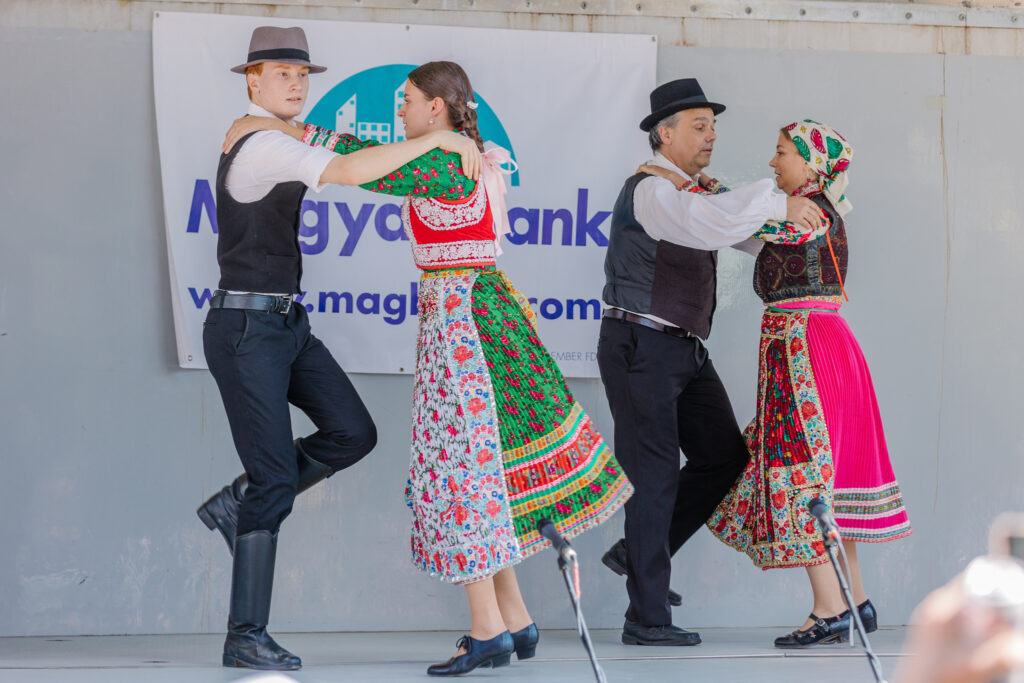
What attracted you to these summer camps as a child?
The rural lifestyle and the community of dancers and musicians. I liked the young people there much more than the ones here. Since we always spoke Hungarian at home and listened to folk music at all times, it felt natural for me to be around Hungarian children in a rural setting. Another thing was that I could hear Hungarian folk music directly from tradition bearers and learn from famous dancers in the camps—something I wouldn’t have been able to do in New Brunswick. Now, my situation is better because I’ve reached the point where I can learn on my own. I find the music of tradition bearers on YouTube, watch dance steps, and follow along—or at least try to…All of my free time outside school goes into this. Long days like the Pontozó competition or the Hungarian Festival are exhausting, but I truly love them. And most importantly, I have a great circle of friends here, and we support each other—though sometimes I feel like I’m the one pushing everyone, but usually, we push each other forward.
At Pontozó, you won two top awards (solo and duo) and received additional recognition for your group performances. Have you always done this well? Are there other competitions in America? Have you ever considered competing in Fölszállott a Páva in Hungary?
I won in solo at the previous two Pontozó competitions as well, and once with my dance group. In the duo category, I was previously placed second with Emma—who, this year, won top gold certificates in two performances, but she danced with others this time: a couple dance with Zalán and a girls’ duo with Lili. I danced with Isa this year. Unfortunately, there aren’t many competitions around here. As for Páva, Emma and I briefly thought about it, but we never took it seriously—the distance and school made it too difficult.
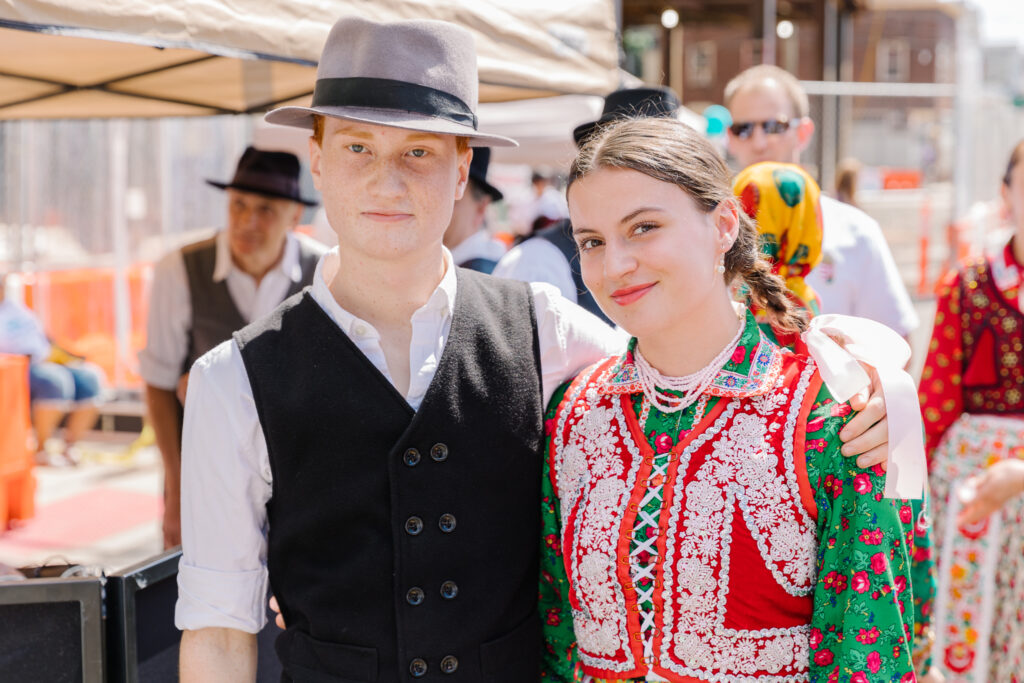
What’s your relationship like with your American schoolmates?
I didn’t really form any deep-lasting friendships with any of my schoolmates. I’ve built a wall around myself at school. They know very little about me, and honestly, I’m not very interested in them either…Of course, things like math homework or sports can be common topics, but I don’t have real personal connections with them. All my relationships are tied to Hungarians. I go to school because I have to—but otherwise, I’m here, in the Hungarian community.
You both folk dance and play folk music—which is more important to you?
It varies; I shift focus depending on the time. Recently, I’ve been more focused on folk dance. We still rehearse and perform with the band, but I have less time for independent practice and listening to music—partly because of the Pontozó competition and the Hungarian Festival. Since I’m a member of the oldest children’s group in Mákvirág and the Csűrdöngölő adult ensemble, I had to prepare for both group performances, in addition to my solo and duo numbers. Plus, this year, we also formed a Men’s Strength (Férfierő) group for the event.
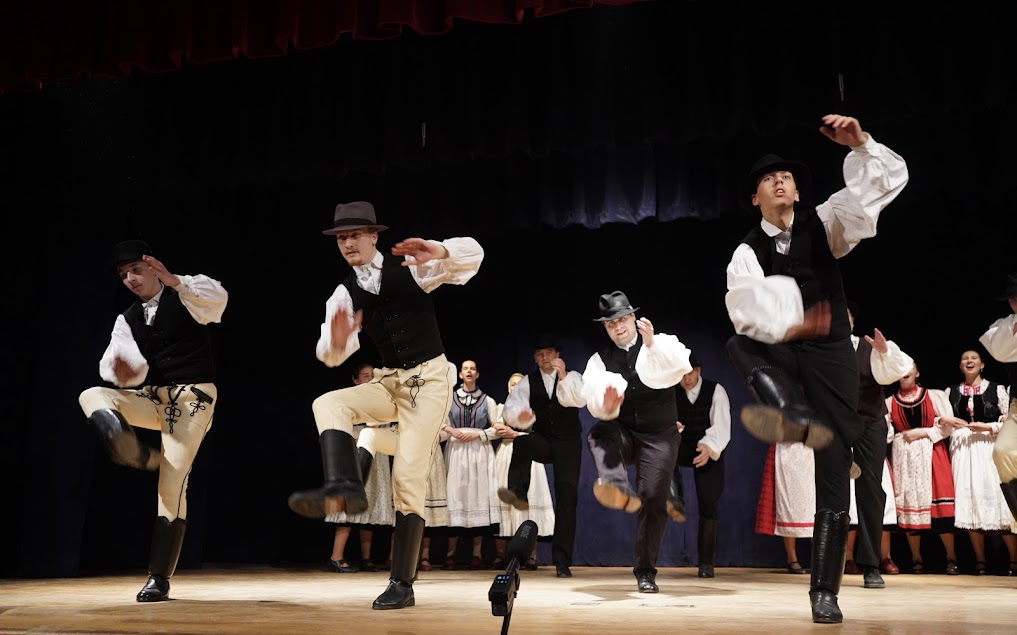
…In which you led the younger generation, while your father led the older generation, and at one point you sang and danced together—it was impressive. Who are the members of your band, and who are you playing for?
The original band, with whom we first learned from András, was called Betyárok, but our current group is Fészer Banda. I grew up together with Bence Kalán, our viola player. Everyone starts on the violin, so at one point, we had a double bass player and three lead fiddlers, which wasn’t ideal for a band. When Bence—who was still living in New York at the time—wanted to join, my mom suggested that he switch to viola because that’s what we needed. He learned it very quickly; he is still developing, but he already has a really good sense of pitch. Our double bass player, Brano Brinarsky, also comes from New York. He’s older and has been playing for a very long time—he even started out with Életfa. He’s incredibly talented; Bence and I practice intensely every week, and when Brano joins us, we rehearse together, and then he’s good to go. We mostly play for ourselves, but we do have joint performances—without them, we probably wouldn’t even play. Last month, for example, we played at a two-day festival in Arizona. We’ve also performed multiple times in New York City, invited by the Réka Darida Foundation.
Your mother told me that you are only willing to play pure folk music. Why?
Sometimes she suggests I should experiment with fusion music, but I’m not interested. My dad also listened to all kinds of music when he was younger, but he, too, stuck to pure folk music once he realized that just because something is good doesn’t mean it should be followed—because we can lose our focus. Thanks to my parents, I grew up with authentic folk music, and I strongly believe that very few people are at the level to successfully reinterpret it. Even among those who can, it rarely turns out well when trying to modify a musical tradition that has developed over centuries. If we mix everything together, it can easily turn into chaos. The result may be great—but that’s rare. That’s why I decided to stick to pure folk music.
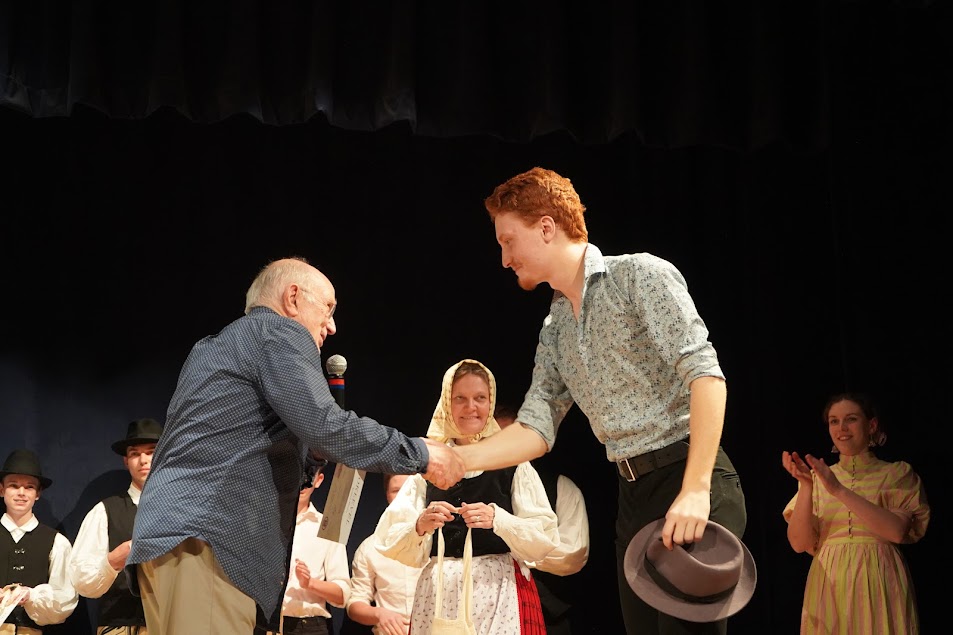
Do you maintain your Hungarian identity in other ways? You speak Hungarian fluently and with a rich vocabulary—something few young people born here can say. Even at Hungarian folk dance events, you often hear a lot of English…
Lately, I’ve noticed that even among friends, we start in Hungarian and switch to English quite easily. I owe my Hungarian language skills and sense of identity to my parents and my friends’ parents, i.e., the parents of my fellow Csűrdöngölő dancers. But the language we speak also depends on the situation: if we’re at the Hungarian Club or in a Hungarian environment, we speak Hungarian, but when we go out somewhere else, we often switch to English. When I travel to Transylvania or Hungary, I tend to struggle to find words at first—not because of an accent, but because my vocabulary is more limited. But after a few days, I get back into it. And then, at the end of summer, when I return here, I start forgetting English words…
As for other ways of maintaining my identity, I’m not much of a reader, which my parents aren’t happy about…I completed Hungarian weekend school, but to be honest, that was more of a mandatory task that I didn’t take too seriously. I sometimes talk about Hungarian history with my dad, but my main focus is folk dance and music.
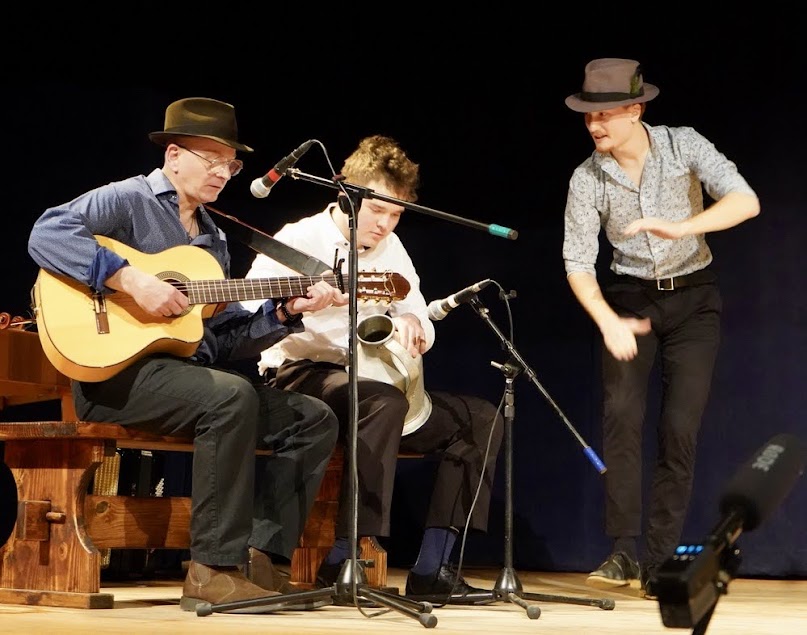
So, is this what you want to do in the future?
Not only this, but Hungarian folk dance and music will always be a lifelong passion for me—it will always be a very important part of my life. At the same time, I’ve seen burnout happen to many of my friends living in Hungary. They are incredible dancers and great people, but they don’t enjoy it as much anymore. I also appreciate professionalism, but when someone’s entire life revolves around this—even if they don’t see it as a job—you can tell it feels like work to them. For example, at a party, they no longer get up to dance—it’s no longer that important to them. I want to keep the joy of dance alive for myself. I’m planning to apply for an architecture degree, but I don’t have a concrete plan yet. I plan to study in Hungary, but even that’s not entirely certain. Summers there were always amazing, but last time, I visited Hungary not during summer, and while I still had a good time, it wasn’t quite the same…The truth is, I feel good where my community is—and right now, that’s both here and there. The Hungarian community here remains strong, though it has shrunk a little, but not much—because we’re bringing in new people, but there’s still some loss. The community here will survive, but not necessarily in the same way we grew up with it. After graduating from school, my friends will move away in different directions, and then this place won’t be the same—not in the way that ties me to it now…I’ve met a lot of people in Hungary over the years, but to truly build a life and a community there, it would take time. For example, I haven’t spent enough time with non-folk dancers there. Even when I interacted with them, it was usually at a folk dance event, so of course, they were interested in that topic, but I don’t know what it would be like if we met outside of that context. That’s another reason why I’m not sure if I want to move to Hungary, besides my friends being here, in New Brunswick. So far, I’ve only spent time in the folk dance world in Hungary—which is bigger than the one here. The community here is smaller and tighter-knit, but it won’t stay that way for long…
Read more Diaspora interviews:

